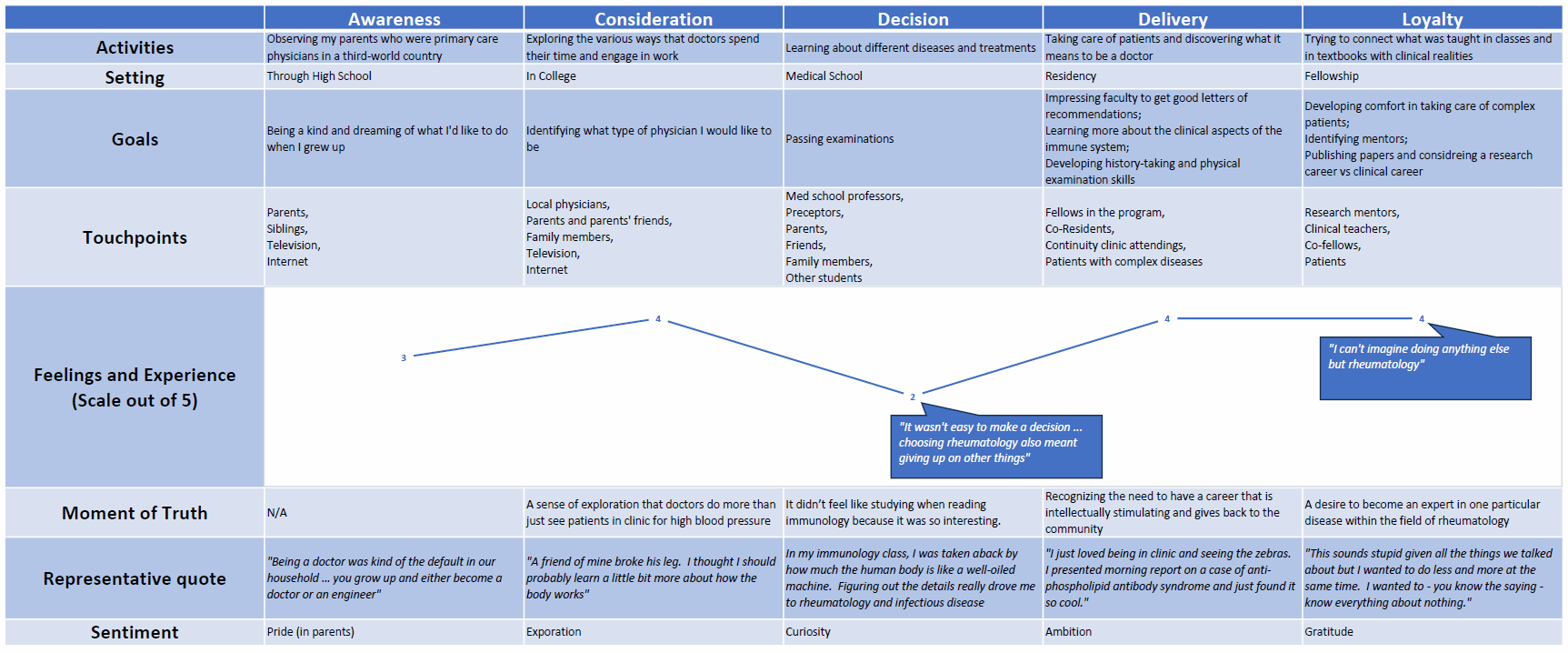Session Information
Session Type: Abstract Session
Session Time: 3:00PM-4:30PM
Background/Purpose: Professional Identity Formation (PIF) refers to the process by which individuals internalize knowledge, skills, values and beliefs, resulting in an individual embracing a sense of belonging as a member of a professional community. Despite its centrality to concepts of professionalism, little is known about the PIF during the course of graduate medical education for rheumatologists. Characterizing the process by which PIF occurs prior to rheumatology fellowship is essential to designing educational interventions to promote specialization of physicians into the field and enhance activities to advance PIF during fellowship.
Methods: Purposive sampling was used to recruit rheumatology fellow physicians and Internal Medicine resident physicians accepted into rheumatology fellowship within the past year. Semi-structured interviews were conducted, and data was recorded via a standardized intake form. Hamilton’s method of rapid qualitative analysis was employed to facilitate analysis of templated information, yielding a 5-stage journey map for each individual participant (Figure 1). Research team members compared and contrasted journey maps to yield themes describing the process by which resident physicians choose to specialize in rheumatology.
Results: 5 rheumatology fellow physicians and 7 Internal Medicine resident physicians were interviewed. Six physicians (50%) identified as female, 8 physicians were international medical graduates (50%), and 4 physicians (33%) identified as being from marginalized communities. Four themes were identified: (1) early experiences and exposure prior to medical education ‘prime’ selection for fellowship, (2) mentorship and sponsorship during residency facilitates specialty selection, (3) self-reflection is often a prolonged process with doubt and uncertainty that slowly reveals clarity and purpose, and (4) physicians often ascribe important milestones in their journeys to luck and chance. Based on these themes, research team members recommend: (1) robust pathway initiatives co-designed with interested early career physicians to catalyze exposure to research and clinical opportunities, and (2) development of virtual communities to share resources and experiences to enable PIF.
Conclusion: Selection of rheumatology for specialization is a complex process that begins prior to formal medical education and training. There appears to be widespread diversity in rationale and timeframes for specialty selection but also similarities that unite experiences throughout their journeys. Multiple actionable opportunities exist for fostering PIF at the resident level to increase the likelihood of attracting interested physicians, broadening the workforce, and advancing a sense of belonging to the larger rheumatology community throughout one’s professional career.
To cite this abstract in AMA style:
Hart R, Kumar B. How Do Resident Physicians Choose a Career in Rheumatology?A Qualitative Analysis of Journey Maps [abstract]. Arthritis Rheumatol. 2024; 76 (suppl 9). https://acrabstracts.org/abstract/how-do-resident-physicians-choose-a-career-in-rheumatologya-qualitative-analysis-of-journey-maps/. Accessed .« Back to ACR Convergence 2024
ACR Meeting Abstracts - https://acrabstracts.org/abstract/how-do-resident-physicians-choose-a-career-in-rheumatologya-qualitative-analysis-of-journey-maps/

